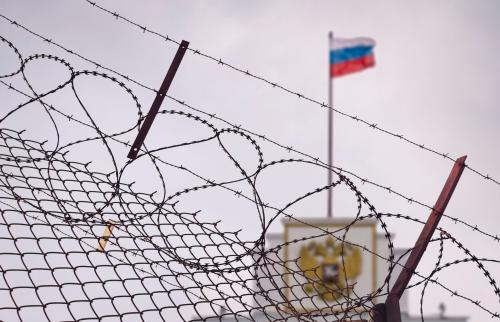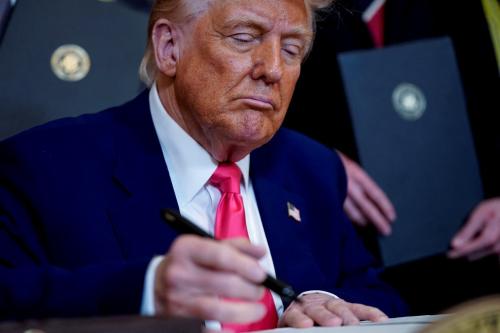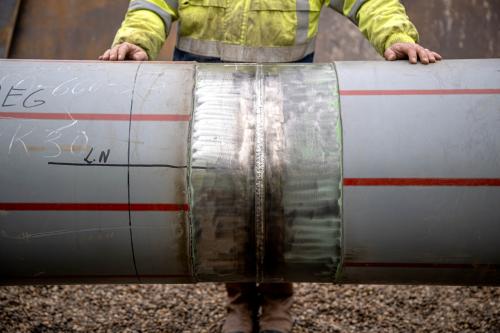Content from the Brookings Doha Center is now archived. In September 2021, after 14 years of impactful partnership, Brookings and the Brookings Doha Center announced that they were ending their affiliation. The Brookings Doha Center is now the Middle East Council on Global Affairs, a separate public policy institution based in Qatar.
Last week’s Viennese waltz may have featured a little flirting between Opec members, but no firm proposals.
There was no output cut, nor even a raising of the group’s production ceiling to acknowledge reality.
This is no surprise. What was notable were signs of adjustment to a new reality – that, after almost a year’s reflection, the initial shock of the falling oil price has worn off. At the Opec seminar, oil ministers from Iraq and Venezuela suggested between US$75 and $80 a barrel as a fair price.
The fiscally more secure members – Saudi Arabia, Kuwait, the UAE and Qatar – all expressed satisfaction that an improving market showed their strategy was working.
Hints that Opec’s notional 30 million barrel per day ceiling might be raised to narrow the gap with actual production of 31.58 million barrels a day last month were clearly too early. It would be hard to set a cap while Iran’s return is imminent. And the ceiling is close to meaningless – Saudi Arabia will not swing its production to balance the group, and Iraqi output continues to reach record highs. Nobody can be accused of “cheating” when the members do not have individually assigned quotas.
The truth is that Opec, in its traditional though misleading guise as a market micro-manager, is structurally incapable of meeting the challenge of shale. The divergence in its members’ interests is too wide – some are fiscally secure and able to fight a price war (the GCC), some rely on major production gains to bridge financial gaps (Iraq and Iran), some are financially vulnerable and unable to raise output (Venezuela, Nigeria and Algeria) and one is in chaos (Libya).
Instead, Saudi Arabia and its Arabian Gulf allies have decided not to offer the weaker members a short-term panacea, but instead to impose on them what is in their own long-term interests.
Some analysts now hold that US shale has replaced Saudi Arabia as the world’s swing producer, able to adjust production quickly in response to market needs. This confuses a swing producer with the marginal producer – the highest-cost source of oil that has no choice but to stop production when prices fall.
The marginal producer’s role is nothing new – historically played by the high-cost North Sea or mature US fields. The difference today is that shale, whose well productivity declines sharply from initially high levels, could respond much faster to price changes – whether down or up – than the behemoth projects of yesteryear.
That is the theory. It has yet to be proved in practice. But supporting evidence includes the 52 per cent drop in active US drilling rigs since last year’s price fall, the signs of stabilisation after prices recovered modestly and the backlog at 4,731 wells (as of February), drilled but waiting for higher prices to be fracked and brought into production.
Observations of rising efficiency, falling costs and the option of cheaply refracking existing wells suggest that shale may be not only quicker to respond to market signals, but more robust at lower prices than earlier thought.
Although this confrontation is being cast as a battle of Opec – Saudi Arabia in particular – against shale, the oil producers to suffer are more the ageing fields in the North Sea, along with capital-intensive, long-term projects in deep water and Canada’s oil sands, which cannot easily be stopped and restarted. That presents the operators of such resources with a dilemma – even if they can theoretically produce at a lower cost than shale companies, the risk of a long-term price slump makes it hard for them to sign on for new investments.
Saudi Arabia’s strategy is working, although too slowly for some of its partners. Yet shale, only a debutante in 2012 and even not present last week, was again the belle of the ball in Vienna.
Editors’ Note: This piece originally appeared in The National.
The Brookings Institution is committed to quality, independence, and impact.
We are supported by a diverse array of funders. In line with our values and policies, each Brookings publication represents the sole views of its author(s).



Commentary
Op-edEnergy debutante shale comes of age at OPEC’s Vienna meeting
June 7, 2015